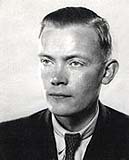Edward Brongersma

Edward Brongersma (August 31, 1911 – April 22, 1998) was a jurist, boylover and boylove activist and for a number of years a member of the Dutch Eerste Kamer ("First Chamber" or Senate).
Life and career
Edward Brongersma was born in Haarlem, the Netherlands, in August 31, 1911 as the second son of an opthalmologist. He studied law at the University of Amsterdam (1931-1935) and for the next five years worked on his Doctor's thesis on Constitutional Law (in Portugal) and wrote articles for a number of legal and general interest publications. In 1940 he received the degree of Doctor of Law at the Catholic University of Nijmegen (cum laude).
During the war until 1950 he was a barrister in Amsterdam and in 1946 he became a Labour Party member of the First Chamber of the States General (the Dutch Upper House of Parliamant, or Senate).
Both careers were suddenly interrupted in 1950, when he was arrested, tried and convicted for having sexual contacts with a young friend of about 16 or 17 years old (born 1932 or 1933). In those days the age of consent for homosexual contacts was 21, in 1971 this was lowered to 16.
After 11 months in prison he made a living as a journalist and, from 1956 to 1959, he was the director of the Federation for Social Assistance to Problem Families in Haarlem. Disbarred as a result of his conviction, he was reinstated at the bar in 1959 and thereafter carried on a legal practice in Haarlem until his retirement in 1980.
From 1960 until 1968 he was an Assistant Professor at the Criminological Institute of the Utrecht State University. He was asked by the Labour Party in 1963 to become again a member of the Dutch Senate for a second period, which lasted from 1963 until his resignation in 1977. From 1968 until 1977 he served as chairman of the Permanent Committee for Justice. In 1975 the Queen made him Knight of the Order of the Netherlands Lion for his distinguished services as a Member of Parlement.
He founded the Dr Edward Brongersma Foundation in 1979 to receive and preserve his collections of literature and private documents on sexuality and make it available on a confidential basis for responsible research. After his retirement in 1980, he devoted his time to his publications, the Brongersma Foundation collection of material on juvenile sexuality and to public enlightenment on sexual matters.
In April 22, 1998 his life was ended with the help of his doctor, Philip Sutorius, via euthanasia. Although he was neither terminally ill nor in any physical pain, he had "lived his life" and believed his life was no longer worth living. This case elicited considerable political and media discussions on the limits of legalised euthanasia in the Netherlands. His diaries, correspondence, manuscripts and other personal items are currently held at the International Institute for Social History, Amsterdam.
Scholarly work
Dr. Brongersma has authored some 1200 books, articles, professional papers, pamphlets, newspaper and magazine articles on law, politics, religion, philosophy, literary subjects, social conditions and sexology. Able to read ten West-European languages, he has written books on the Civil War in Spain, Portugal and the Portuguese, penal law and social problems. Beginning with his years at the Criminological Institute, he has written extensively in the area of sexology, especially on pornography, pedophilia and the age of consent. His books on this subjects include: Das Verfehmte Geschlecht (1970), Sex en straf (1972), and his two-volume magnum opus Jongensliefde (1987, translated as Loving Boys). He also contributed extensively on several boylove publications including Pan: A Magazine about Boy-Love, O.K., NAMBLA Bulletin, L'espoir and others. From 1987 to 1995 he served in the editorial board of Paidika: The Journal of Paedophilia. His most important scholarly contributions on boylove in English include:
- "Sexuality and the law," Journal of the American Institute of Hypnosis 14, no. 5 (1973): 220-221.
- "The meaning of 'indecency' with respect to moral offences involving children," British Journal of Criminology 20, no. 1 (1980): 20-34.
- "Aggression against paedophiles," International Journal of Law and Psychiatry 7, no. 1 (1984): 79-87.
- "A defense of sexual liberty for all age groups," The Howard Journal of Criminal Justice 27, no. 1 (1988): 32-43.
- "The Thera inscriptions: Ritual or slander?" Journal of Homosexuality 20, nos. 1/2 (1990): 31-40.
- "Boy-lovers and their influence on boys: Distorted research and anecdotal observations," Journal of Homosexuality 20, nos. 1/2 (1990): 145-173.
Obituaries
- Jan Schuijer in Journal of Homosexuality 37, no. 4 (1999)
- L. van Naerssen in Tijdschrift voor Seksuologie 22, no. 3 (1998)
- Robin Sharpe in NAMBLA Bulletin [1]
External links
- This article uses material from the Wikipedia article about Edward Brongersma
- Political biography in the Dutch Parliament website.
- Biography at Brongersma Foundation website.
- Burning the Library (IPCE)